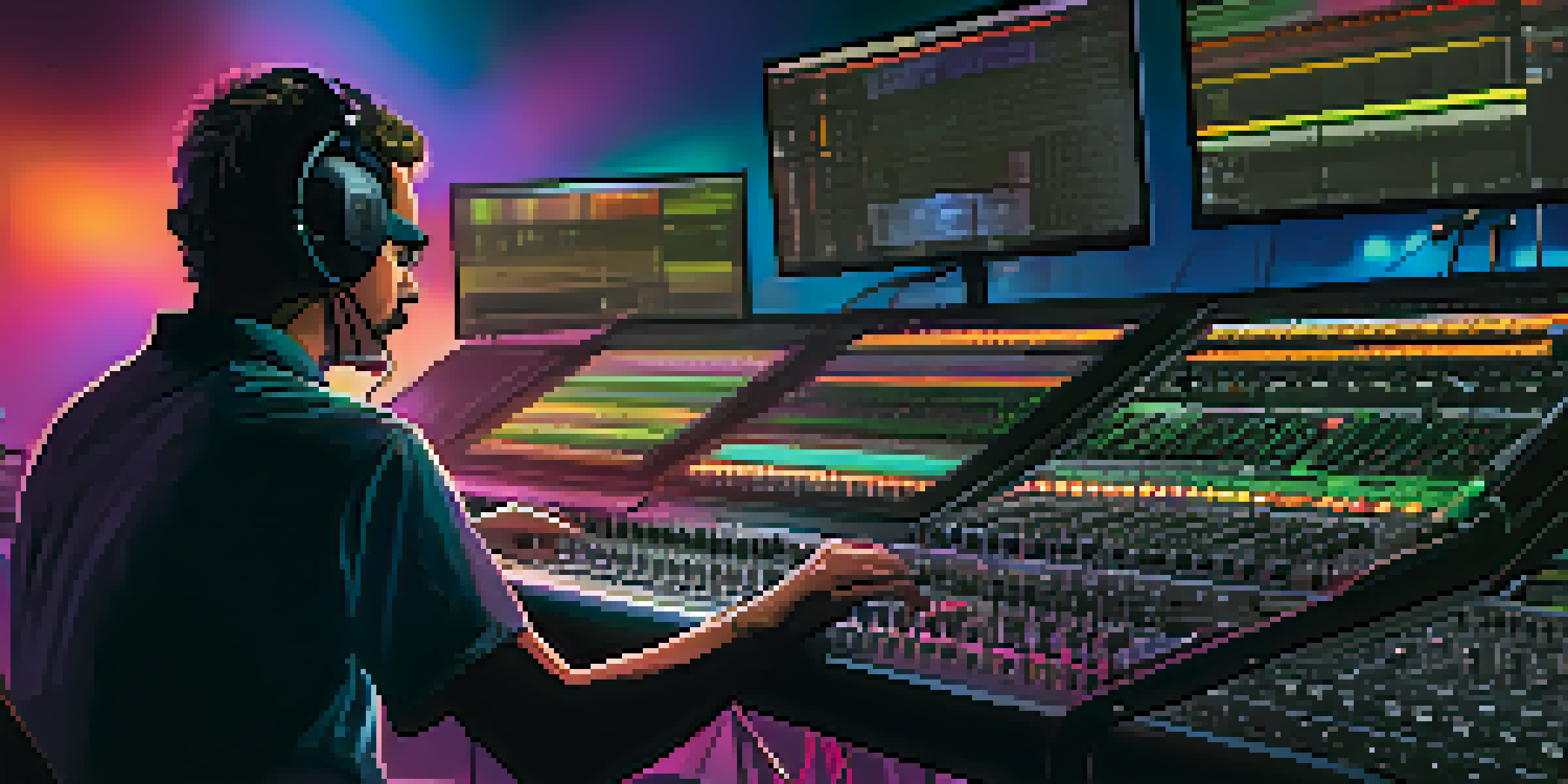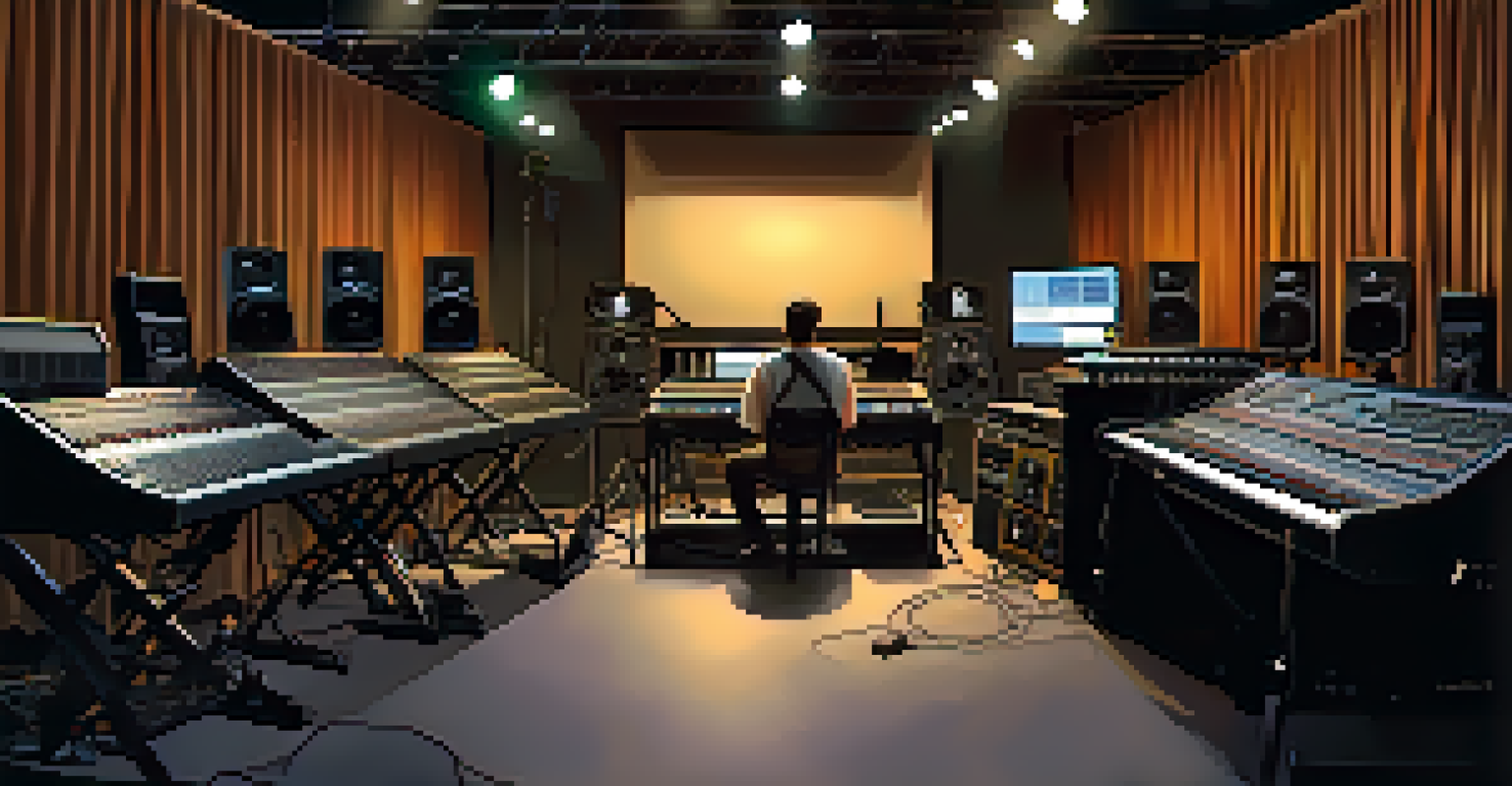The Role of a Monitor Engineer in Live Sound Production

What is a Monitor Engineer and Their Importance?
A monitor engineer plays a crucial role in live sound production, focusing on the sound that performers hear on stage. Unlike the front-of-house engineer, who manages the audience's audio experience, the monitor engineer ensures that musicians receive the proper mix of instruments and vocals through their monitors. This role is vital because performers depend on accurate sound feedback to deliver a great performance.
The sound engineer is the unsung hero of the live event industry.
Imagine a chef cooking in a bustling kitchen. Just as they need to taste their dishes to adjust flavors, musicians need to hear themselves and each other clearly to stay in sync. The monitor engineer acts as that chef's taste tester, fine-tuning the audio mix so that everything sounds just right. Without their expertise, it can be challenging for artists to perform at their best.
Ultimately, the monitor engineer’s work directly impacts the quality of the live performance. By ensuring that each musician can hear what they need, they help create a cohesive sound that resonates with the audience. Their role is often behind the scenes, but its significance cannot be overstated.
Key Responsibilities of a Monitor Engineer
The primary responsibility of a monitor engineer is to create and manage the stage sound mix for performers. This involves setting up and adjusting monitor speakers, in-ear monitors, and other equipment to meet the specific needs of the artists. Each musician typically has unique preferences, and the monitor engineer must be adept at accommodating these variations.

Another critical task is to communicate effectively with the musicians during rehearsals and performances. This means understanding their feedback and making adjustments on the fly. Think of it like being a personal trainer in a gym: you need to listen closely to your client’s needs and tweak their routine to help them achieve their goals.
Role of Monitor Engineers in Sound
Monitor engineers are essential for ensuring performers receive the right audio mix, allowing them to deliver their best performances.
Lastly, monitor engineers must troubleshoot any technical issues that arise during a performance. Whether it’s a feedback loop or a malfunctioning speaker, they need to think quickly and find solutions to keep the show running smoothly. Their ability to remain calm under pressure is essential in maintaining the flow of the event.
Essential Skills for a Successful Monitor Engineer
To excel as a monitor engineer, one must possess strong technical skills and a deep understanding of audio equipment. This includes knowledge of mixing consoles, microphones, and various monitoring systems. Being familiar with the latest technology allows them to optimize the sound for each unique venue.
Good sound is like good cooking; it should be effortless and seamless.
Additionally, excellent communication skills are vital. A monitor engineer must effectively engage with musicians, understanding their needs and preferences. This is much like being a good listener in a conversation; the better you listen, the more effectively you can respond.
Finally, problem-solving abilities are crucial. Live sound production can be unpredictable, and a successful monitor engineer must be ready to tackle any challenge that arises. Think of them as a firefighter, always prepared to respond to emergencies and keep the situation under control.
The Equipment Used by Monitor Engineers
Monitor engineers utilize a variety of equipment to ensure performers receive the best sound possible. This typically includes monitor speakers, in-ear monitors, mixing consoles, and audio processors. Each piece of equipment plays a unique role in delivering the sound that artists need to perform effectively.
For example, in-ear monitors (IEMs) have become increasingly popular as they provide a more controlled listening environment for musicians. They help reduce stage noise and allow for a clearer sound, much like using noise-canceling headphones in a busy café. This technology has revolutionized how performers experience live sound.
Key Skills for Monitor Engineers
Successful monitor engineers need strong technical skills, effective communication, and problem-solving abilities to navigate the challenges of live sound production.
In addition to audio equipment, monitor engineers often rely on software for sound analysis and management. This can include digital audio workstations (DAWs) and specialized monitoring software. These tools help them visualize and adjust the audio signals, ensuring that every element of the mix is perfectly balanced.
Collaboration with Other Production Team Members
The monitor engineer is part of a larger team that includes front-of-house engineers, stage managers, and lighting technicians. Collaboration is key in live sound production, as each team member contributes to the overall experience of the audience and performers. Think of it as a well-rehearsed orchestra, where each musician plays their part to create a harmonious performance.
Communication is essential in this collaborative environment. For instance, the monitor engineer needs to relay any specific requests from the performers to the front-of-house engineer, ensuring that everyone is on the same page. This synergy helps create a seamless audio experience for both the artists and the audience.
Moreover, working closely with the production team allows for a smoother setup and teardown process. By coordinating efforts, they can quickly address any issues that arise and adapt to the dynamic nature of live events. This teamwork ultimately enhances the quality of the show and contributes to its success.
The Challenges Faced by Monitor Engineers
Monitor engineers encounter various challenges while working in live sound production. One major hurdle is dealing with the acoustics of different venues. Each location has unique sound characteristics, and the engineer must adjust their mix accordingly. It’s similar to cooking in a new kitchen; you need to familiarize yourself with the tools and ingredients available to create the best dish.
Another challenge is managing the expectations of musicians. Some may have very specific preferences regarding their monitor mix, which can be difficult to accommodate, especially in a fast-paced environment. Balancing these requests while ensuring overall sound quality requires patience and skill.
Future Trends in Monitor Engineering
As technology advances, monitor engineers must adapt to innovations like wireless systems and immersive sound experiences to remain relevant in the industry.
Additionally, monitor engineers often work under high-pressure conditions. With hundreds or thousands of audience members watching, any technical mishaps can have significant consequences. Staying calm and focused, even in stressful situations, is essential for maintaining the quality of the performance.
The Future of Monitor Engineering in Live Sound
As technology continues to evolve, the role of the monitor engineer is also changing. Innovations like wireless monitoring systems and advanced sound processing software are becoming more common, allowing engineers to create even more customized audio experiences for performers. This trend is similar to how smartphones have transformed communication—making it more efficient and effective.
Moreover, the rise of virtual and augmented reality in live events presents new opportunities and challenges for monitor engineers. These technologies require a different approach to sound mixing and monitoring, as the immersive experience relies heavily on audio quality. Adapting to these changes will be crucial for engineers looking to stay relevant in this evolving landscape.

Ultimately, as live sound production continues to grow, the demand for skilled monitor engineers will remain strong. Their ability to create a supportive audio environment for performers is essential to the success of live music events. Embracing new technologies while honing their craft will ensure that monitor engineers continue to play a pivotal role in the industry.